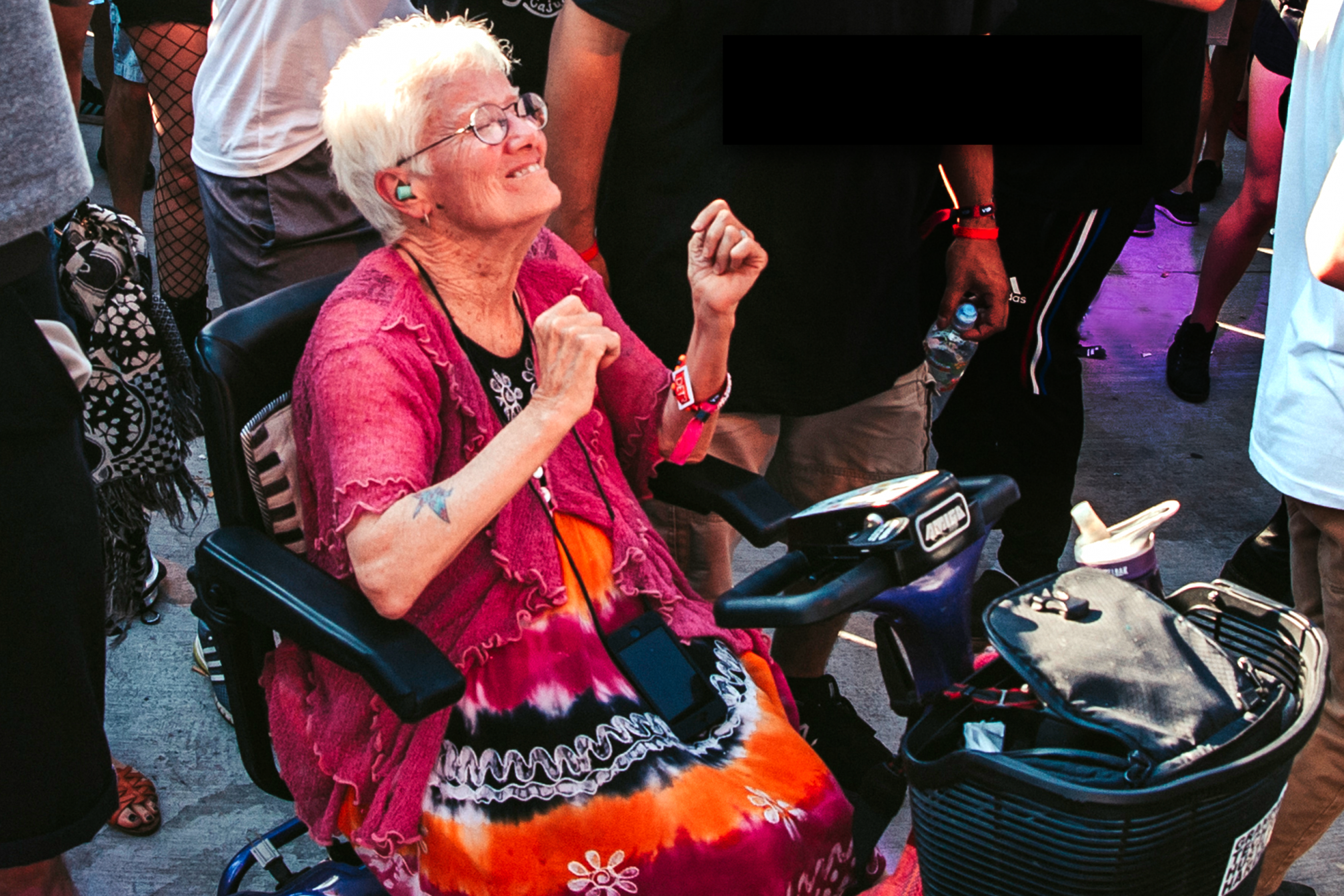 Features
Features
Grandma Techno: "I love the energy. Techno feels like the hippy movement of the 1960s"
Her second photo book comes out this week, covering a decade of bliss at Movement Festival
Patricia Lay-Dorsey, or more affectionately known as “Grandma Techno”, has become a staple of Detroit’s beloved Movement Electronic Music Festival. She’s a 77-year-old legend with a tender passion for the community and care forged by the dance music scene. She's been attending the event since 2005, where she gained her fabled nick-name along with the realization of her love for electronic music itself.
Grandma Techno has been confined to a mobility scooter since 2000, after she was diagnosed with Multiple Sclerosis. This has given her a unique perspective to view both the crowd and the event as a photographer. She wheels freely through the festival grounds with the assistance of her longtime friend Patrick Alejas, and more recently Emily Swank, who both make sure she's well taken care of. In recent years, Grandma Techno has even had a reserved space to view the main stage with the sound technicians, due to the hospitality of Paxahau, the event producers of Movement. This time-honored experience has been earnestly presented in her latest book They Call Me Grandma Techno, which is due to release on Saturday, August 10.
Mixmag recently caught up with Grandma Techno to discuss her life, ethos and the intention behind publishing over a decade of scenes and sentiments caught among the Movement masses.
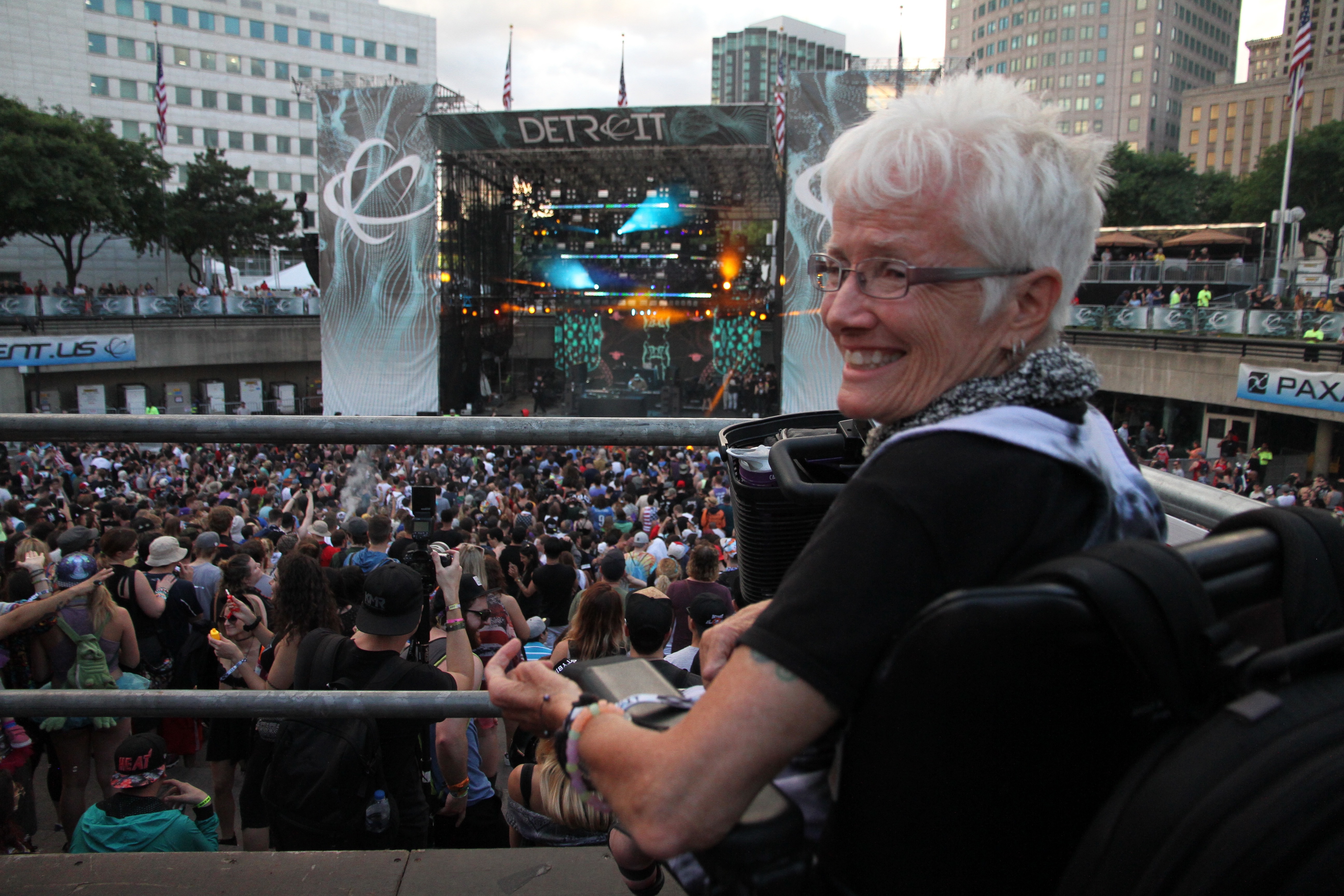
How does it feel to have another glossy expose of your work?
This is my second published photo book, so I’ve been through the process before. My first published book was in 2013, so it’s wonderful when you hold it in your hands. Especially since this is a long-term project, holding over 12 years of photos, it was wonderful putting everything together. I really can’t wait until the launch and to see the response of the young people. Many of whom are in the book and don’t know they’re in it, and there are hundreds of photos and many of them are group photos. So people will be finding themselves and that will be fun.
What do you think your story has to say about empathy between generations?
All I can speak about is my own experience.. I mean, I was coming into their world. They were not coming into my world. So that puts me in a position of being their guest, which was more or less the way I’ve always felt. By now, I’m pretty much a part of the scene, but at the beginning I wasn't. I was much, much, much older than anybody, and being disabled on top of it, and not knowing anything about electronic music, especially my first year in 2005... So they were teaching me. I think that the young people knew that, that I wasn’t coming there not as some old lady who wanted to tell them what to do or what to like, but that I was trying to learn from them and pick up on their energy, which is really what I love best about the music and the festival.
I love the energy most, it feels like the 1960s - “Peace and Love” and all of that, which I have since discovered is more or less the ethos of electronic music. I don’t know if it’s as true with EDM, which is kind of a different genre because it’s more pop, but certainly the traditional electronic music, with its own cult world. It has its own ethos. From my personal experience, that ethos is very respectful of other people, and loving, and just high energy, blissing out a lot. Just really having fun. I mean, who could not like that?
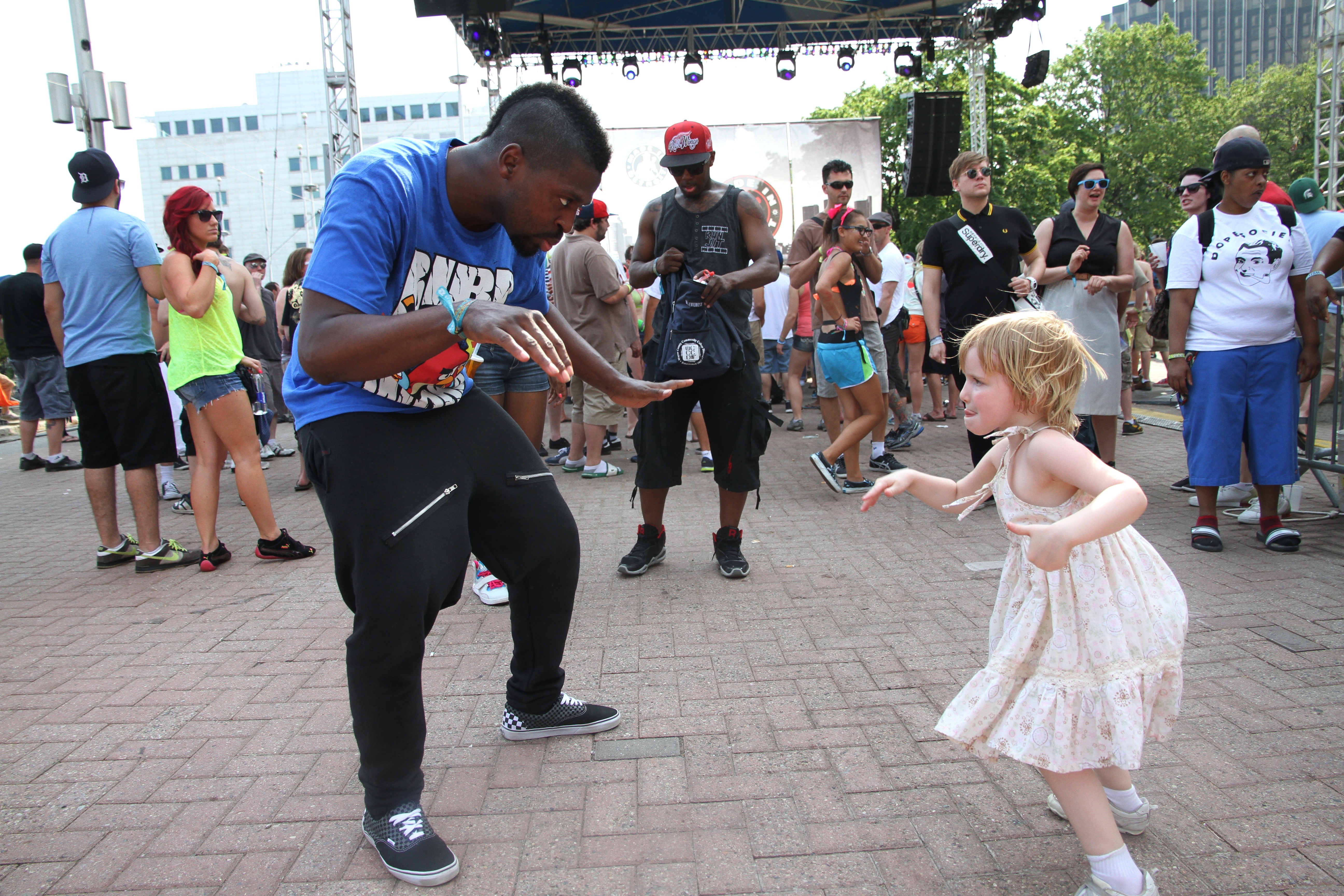
In what ways has rave or dance music culture challenged any cultural barriers in your life?
In relation to me in the 1960s, I was in graduate school and doing social work, I got married.. and I wasn’t a part of the whole "60s scene." For one thing, I’ve never used drugs! So I wasn’t a part of the world at all, but I’d see pictures of it and hear about it. I've been there 15 years, and the young people that were at the festival my first year are now bringing their children, and some of them, their grandchildren. So I’m learning from them to be more open to whether or not people are on drugs. I was pretty close minded on that. It isn’t something I wanted to do. I still don’t do it.
In the old days I had a bit of a negative attitude toward anyone who would use drugs. I certainly don’t anymore. What I experience with the young people is… the kind of drugs… it really depends on the kind of drugs they use. At our festival, anyway, I think they might use a lot of ecstasy, which doesn’t make people aggressive. If anything I think it helps them bliss out. I don’t see any aggressiveness or disrespect. I’ve never seen any disrespect in my 15 years there. I’ve never even seen an argument, much less a fight. And we’re talking over 100,000 people each year, so to me that’s rather remarkable. I’ve learned a lot from them, to be much more open and accepting, and letting them be themselves and see who they are. I love it... I love who they are.
Can you speak to your decision to never experiment with drugs?
I’ve never even taken a puff of marijuana! I don’t drink at all either. When I was diagnosed with Multiple Sclerosis in 1988, so over 30 years ago, I decided at that point I would get totally off of alcohol. I just felt I needed to be in control of my body as best I could and not let any external substances screw me around. I’m not real fond of “pharmaceutical” anything. I’ve been diagnosed with MS for 30 years and I’ve never taken any medication for it, at all. I don’t even have a neurologist. I don’t do a lot of doctoring… I change my diet, exercise, maintain a positive mental attitude. I want to stay on top of everything. I remember even when I would have just two glasses of wine at night, I’d wake up the next morning and not feel all there.
I want to feel all there, which is what I am, and that means a lot to me.
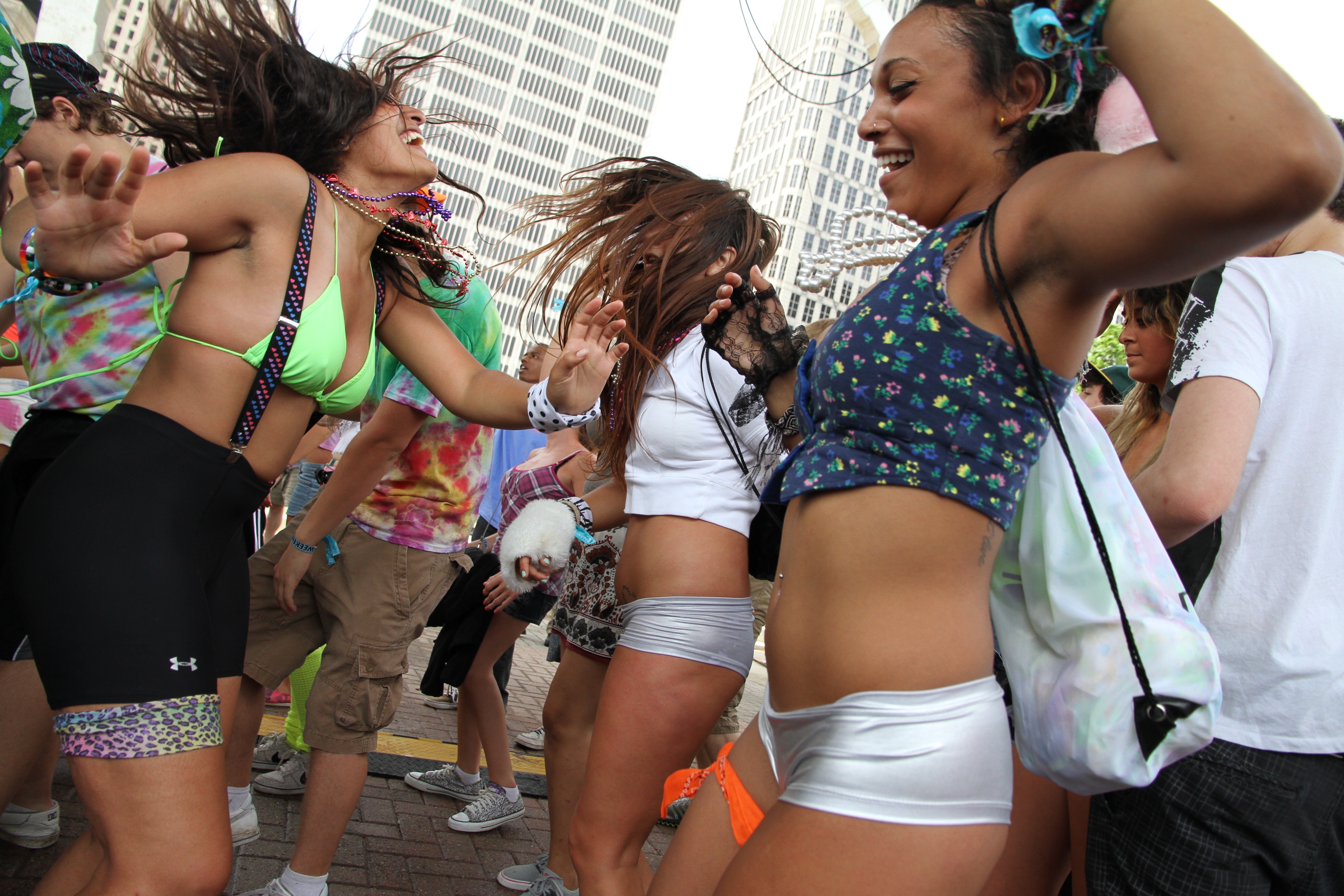
What about Movement and the city of Detroit allows you to be “all there”?
Hart Plaza, where Movement takes place, is smack-dab in the middle of downtown. It’s right on the river, and you look across and there’s Windsor, Ontario. There’s just something about Detroit. People who come from out of town really love Detroit, especially the festival people who come from all over the world. In a way, it’s like a small southern town, where everyone is very friendly and welcoming.
I guess people hear about the vibes, it being a crime center and all of that. I guess in certain neighborhoods and under certain circumstances it can be dangerous to live there. But I always go to all of these things by myself, and I’ve been in my scooter on a dark street at 1 AM in the morning and I’m not scared at all. If something feels weird I’ll do what needs to be done, but I’ve never had anyone bother me. Detroit is my love, Detroit is my city, and Detroiters are my people. I feel fortunate to be accepted into a lot of communities. Generally I’m at the festival for all hours it’s open, then I get up the next day and do the same thing again. I use my energy at Hart Plaza.
Does being in a mobility scooter in thick crowds of ravers ever feel overwhelming, or have you gotten used to it by now?
You know I’ve always been a little claustrophobic, and there’s something very different about being in massive mobs of people when you can’t see over anyone. You’re looking at people’s belly buttons and butts. It’s a different experience in a crowd like that. It’s been very helpful with my friend Patrick, who adopted me in 2006. He comes every year from San Antonio and stays by my side, helps me get through crowds to get to other stages. I would never be able do it on my own. This most recent year Emily Swank helped me a lot as well. She's Claude VonStroke's sister and was my absolute angel during 2019.
But now, I have found the young people are so used to Grandma Techno, that if they see me trying to go to a stage by myself, all I have to do is ask someone. I’ll say, “Would you please walk ahead of me and clear the path?” What happens then is so adorable. This person goes in front of me, clearing the path and I’m coming up right behind, and the young people start yelling, “GRANDMA TECHNO! GRANDMA TECHNO!” and they’re cheering! I’m sure the people on stage are wondering what they’re cheering about. So I’m really well taken care of at this festival. But it can get hairy, especially because of drinking. I have my nice camera and I don’t particularly want beer poured on me, so I have to watch out for that, especially at night.
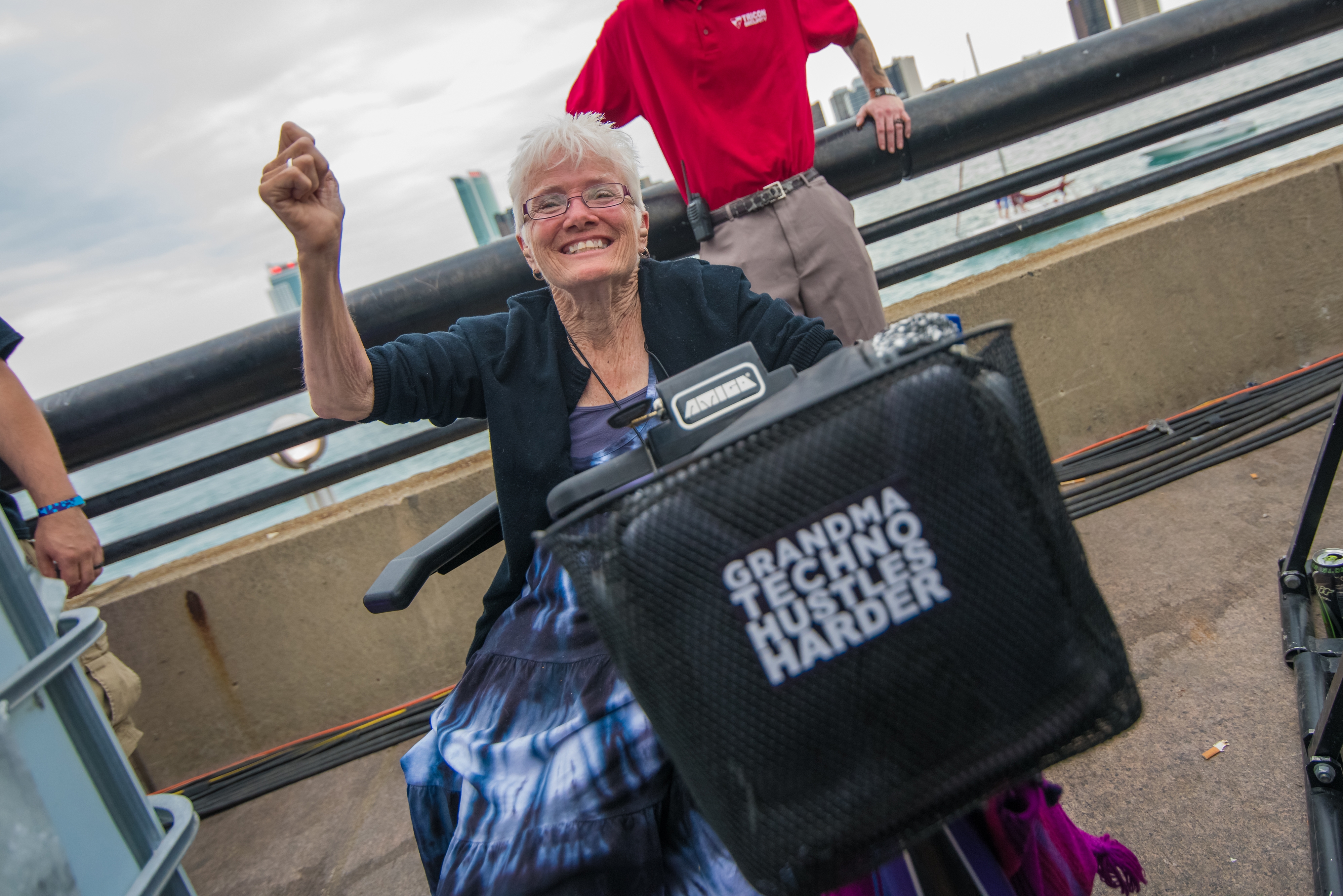
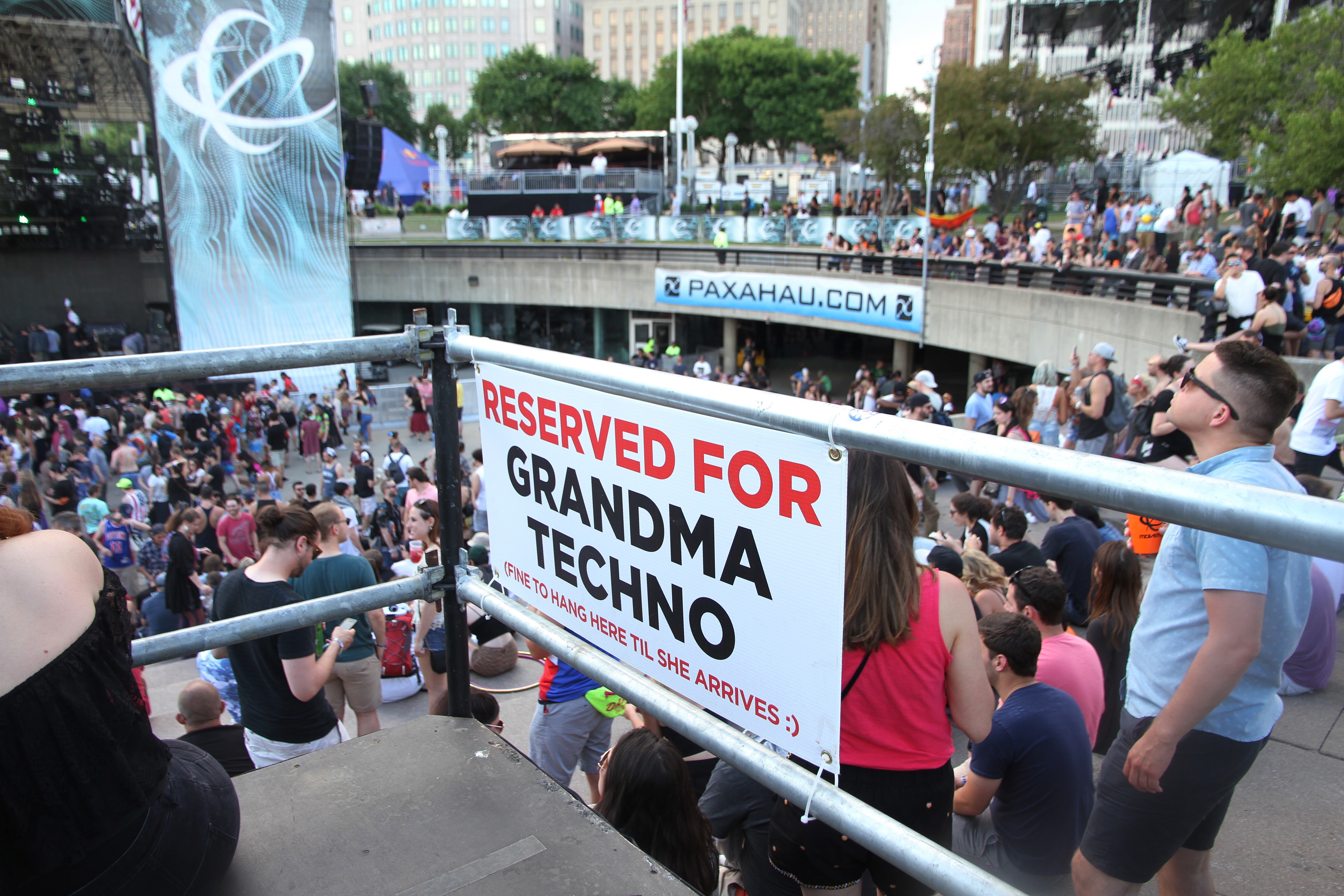
How does your scooter perspective inform your photography?
As a photographer, being in a mobility scooter is unique. The kind of perspectives that non-disabled photographers can get, a lot of them are unavailable to me. So when I’m coming up with projects to work on, it needs to be some place I can get to with my scooter, again from my angle, which is always looking up. Normally, if I’m in the middle of crowds, which is where I like to take my pictures, I’m looking up at people. When you’re doing portraits, you have to choose what point-of-view you want. If you are trying to capture someone to be seen with more validity and celebration, you shoot from below. As that’s the way I always take photos, everyone looks big and wonderful, even if I’m right in the middle of it. They’re all worthy of my attention, and I like that everyone feels seen, heard, and valued. This is really one of the things I want to put across in my photography. I like looking up.
How does it feel to be considered a “Grandmother”, despite not having children of your own?
My husband and I married in 1966, and we always wanted kids but I never got pregnant. That just never happened. We were fortunate, as both my husband and I liked young people, so the kids in the neighborhood discovered us and they would hang out at our house for years, around the years we would have had children of our own. We’d host Christmas parties for hundreds of kids in the neighborhood, organize long distance bike rides, going to the state fair... So I had that experience, feeling like I had kids, but of course I could send them home at the end of the day and I didn’t have to pay for college.
But then as my peers started to have grandchildren, I didn’t. I was ambivalent about it, because what I found with my friends who had grandchildren was that it was taking a lot of their time and energy, and didn’t have much left for anything else. When I was in my 30s, I discovered that I had some artistic talent and became very involved as an artist. I treasured that, and realized that if I had birthed grandchildren, I couldn’t do everything I do, because I would want to take care of them and help out. But as it was, I was free and I like that. I really like being free to do my own thing.
But now, it’s the best of both worlds. Everyone calls me and says, “Hey Grandma! How are you?” People follow me on Instagram, see what’s going on in my life, and send me notes… So I have the joy of being a grandmother without the responsibilities or time away from my art and doing my own thing. Sometimes, I get a little teary eyed thinking how much it means for a young person to say, “I love you, Grandma…” It’s so authentic and so tender. I think in those moments I really have a feeling of what it’s like to have your own birth grandchildren and what it touches in you. It’s very deep, there really are no words. So I’m grateful for being everyone’s grandma. It’s amazing.
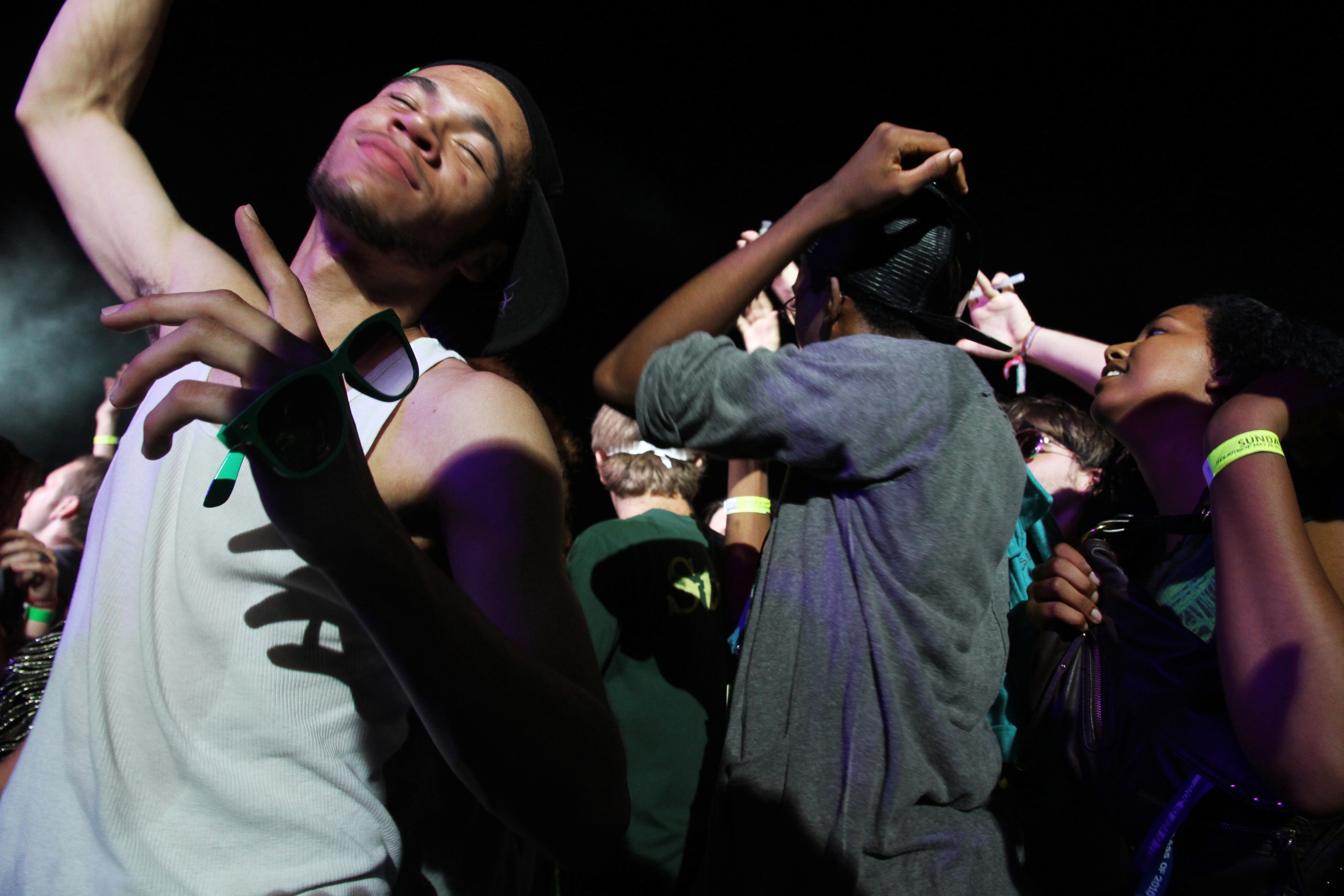
I saw you said on social media that you consider ANNA to be a “priestess”. Do you consider DJs and producers to be quasi-shamen, in a way?
Oh gosh, ANNA… I didn’t even know about her until this year, and now we’re Instagram friends! That was something Movement did differently this year, with at least one third of the performers being women, maybe over a third. It was certainly the most ever and I really loved going to the women DJ gigs. So ANNA was over at the Pyramid Stage one afternoon by the river, and you know how it is… it doesn’t happen often, but sometimes the way a DJ mixes or the energy of the tracks just goes under your skin and down to your core, and your whole body starts vibrating. But it isn’t just your body... I’m not a church person, but this is as close as I’ll ever need to get. It was very spiritual. She sent me off into a world that I’ve never been before. In all my years at the festival, ANNA took me somewhere new. In my Instagram post I called her a priestess, because that was what it felt like. And she found my post and told me she was so moved by what I wrote, but boy… she sure moved me. Oh my god, I love her.
I know enough about music, DJs and the mixing to know that what comes through their music has to be in them first. It has to be who they are. So what I knew was that ANNA is an amazing woman, very deep, and very loving, and somehow very compassionate, I could feel it in her music. When it happens, boy... it’s so special. I vibrated for hours afterwards, literally. It’s when it happens like that, that I know why I bump this music.
It rarely happens to that degree... so when it happens like that, I go into this other world. It’s more than bliss. They take me someplace I never even knew existed, until they take me there. It’s something about them, the timing, what they put together, it’s something about the crowd around me, where I am in my own journey… As I say, deeply spiritual. So as for whether I’d consider them techno-shamen - at their best, yes. But of course, not all are. As I understand it, what a shaman can do is help us all experience our one-ness - which is what I believe, again, at its best, the electronic music beat is to me, like the heartbeat of the world. That’s our language, we don’t need another language. I can be in the same stage area with people who are speaking God knows how many different languages, but our hearts beat as one because of that bass beat. It’s up to the shaman on the mixer to make that change.
I have gotten kind of fussy about what I want to hear. I don’t want to hear a sameness or a predictability in the mixes. I want them to keep me engrossed, and the way I stay engrossed is shifted around. Change it, and I’ll be loving what you’re doing, and then suddenly go somewhere else and that will be amazing. We’re all in it together, and to me one of the most important things about this festival and what I would bet is true at many electronic music festivals. That we all become one body, one heartbeat, and there’s just such deep love in it, but that love needs to be coming from the people mixing the music.
If you could offer a piece of the inspiration that you’ve found in your life, what would you want to share with people?
Dare to be yourself. Always dare to be yourself, and don’t let anyone else put you into any kind of place where they think you should be. If you have a passion about something, follow that and see where it takes you. Don’t be too realistic about trying to make a living. Forget that... follow the passion. You don’t know where it will take you. I’ve had so many chapters in my life following my passion, and I never know where it takes me. You have to be daring, and willing to jump off a cliff. Trust something will catch you, because its always caught me when I jump off of cliffs...
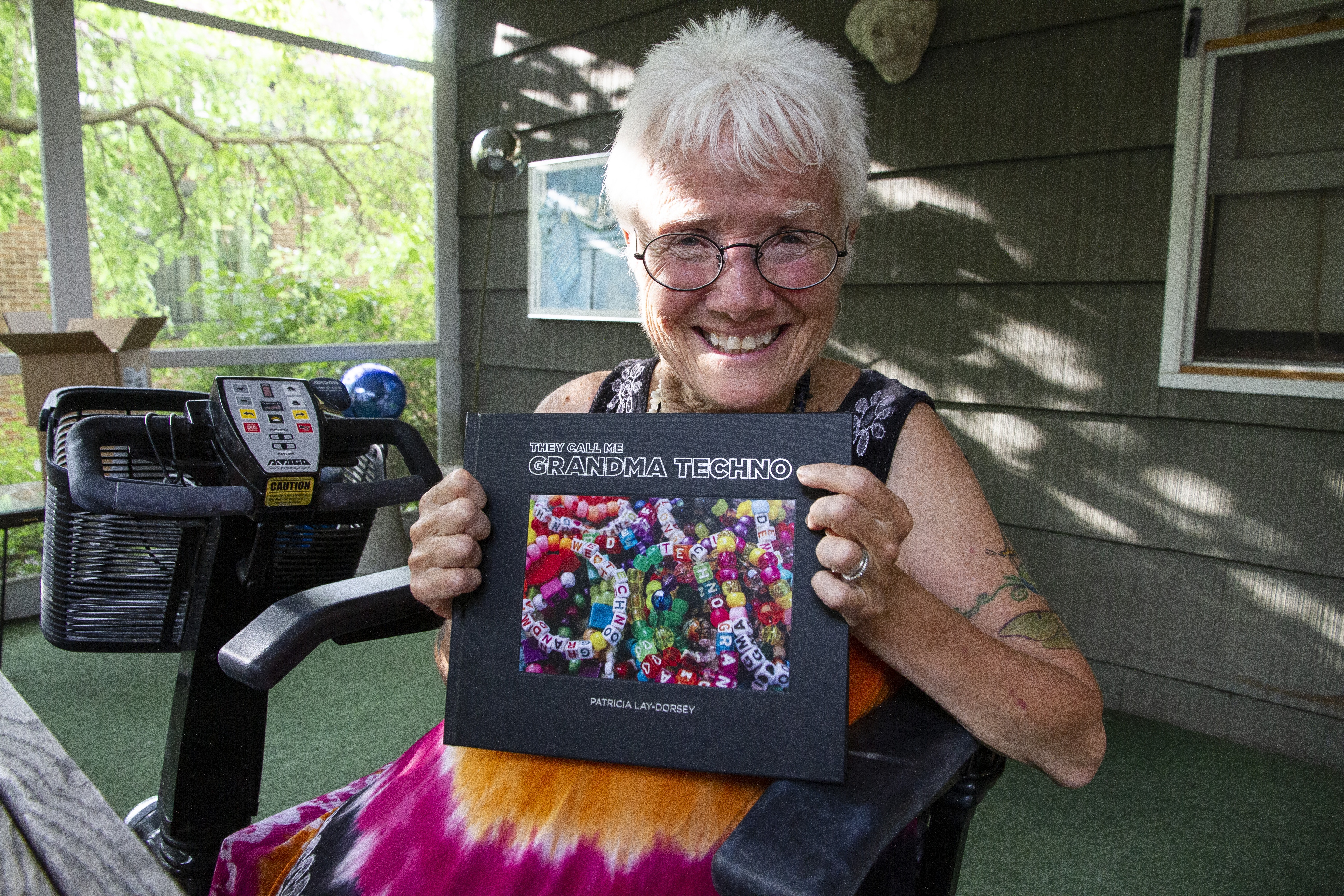
Grandma Techno will be at the Marble Bar in downtown Detroit on Saturday, August 10, from noon until 8 PM. This art and music event, hosted by the female-centric Sheometry Festival, will celebrate the release of her latest book They Call Me Grandma Techno, and serve as an opportunity for fans to meet her and get their copies signed.
Ryan Baesemann is an Editorial Contributor to Mixmag. Follow him on Twitter.
Photos provided by Patricia Lay-Dorsey, Nick LeTellier, Stephen Bondio, Emily Swank, Jesse Cory, and Amy Hubbarth.
Read more here:
The rave spirit of Detroit is what makes Movement Festival truly shine
Never mind nostalgia - we’re living in a Golden Age of intergenerational partying
Detroit is the birthplace of techno and it won’t let you forget it
Get the best of Mixmag direct to your Facebook DMs


